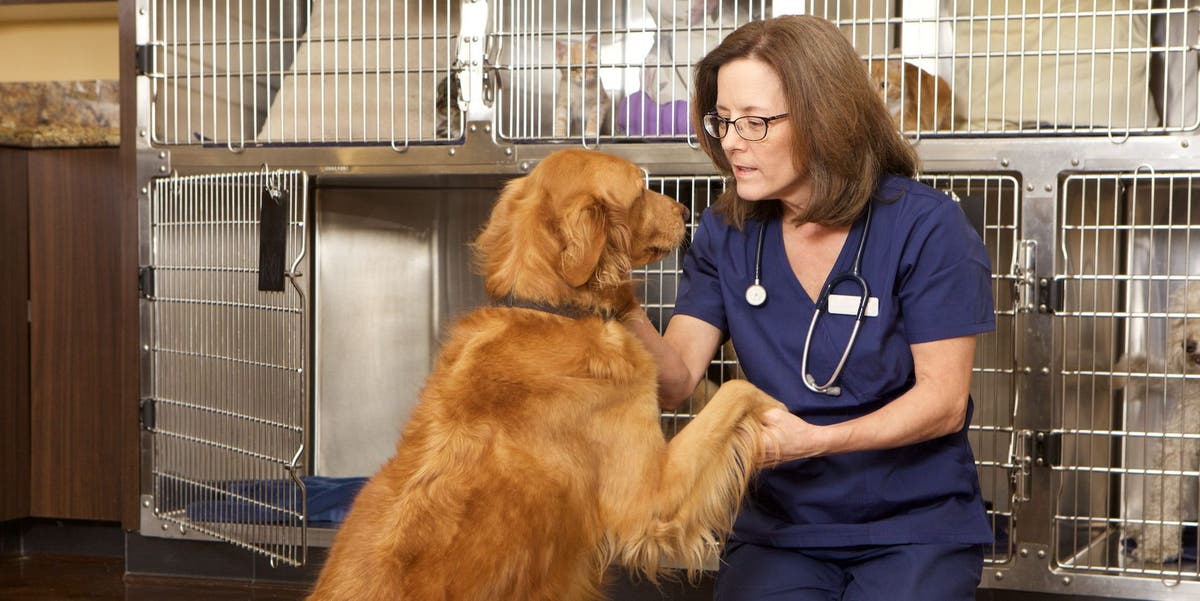Canine behaviourist near me: the ultimate checklist for pet owners
Recognizing the Role of a Veterinary Behaviourist in Family Pet Training and Health
The function of a veterinary behaviourist is necessary in resolving the complex connection between animals and their owners. They incorporate vet medicine with understandings from pet habits science to tackle issues like hostility and anxiety. Unlike conventional trainers, their strategy concentrates on the underlying causes of these actions. This nuanced viewpoint questions about the performance of traditional training methods and just how a much deeper understanding can change pet well-being. What approaches do they utilize to achieve these outcomes?
What Is a Veterinary Behaviourist?
A vet behaviourist is a specific professional who focuses on understanding and attending to the behavioral concerns of animals, specifically animals. Their experience incorporates veterinary medicine and pet behavior science, allowing them to detect and deal with a large variety of behavior problems - cat behaviourist near me. These professionals usually hold postgraduate degrees, such as a Master's or PhD in animal actions, and are certified by appropriate companies, guaranteeing they possess a deep understanding of animal psychology
Vet behaviourists analyze animals with detailed observation and evaluation, taking into consideration aspects such as genetics, setting, and training background. They create tailored therapy plans, which may consist of desensitization strategies, favorable support approaches, and environmental modifications. Partnership with pet proprietors is essential, as they supply support and assistance throughout the training procedure. Inevitably, the goal of a veterinary behaviourist is to boost the well-being of the animal while fostering a harmonious relationship in between family pets and their proprietors.
The Importance of Understanding Animal Habits
Comprehending animal behavior is crucial for both pet owners and professionals in the area of pet care, as it lays the foundation for effective communication and training. Identifying just how pets view their environment and reply to stimulations allows caregivers to create a more harmonious living scenario. Understanding into behavior signs, such as body movement and vocalizations, fosters stronger bonds in between animals and their owners. By valuing the all-natural impulses and needs of different species, people can customize their training approaches to accommodate these factors, promoting much better knowing and collaboration. Additionally, a strong grasp of behavior science help in determining stressors and possible triggers, allowing for aggressive interventions. In general, recognizing pet habits not only improves the health of family pets but also improves the experiences of those who take care of them, eventually leading to much healthier, better partnerships.
Typical Behavioral Issues Addressed by Vet Behaviourists
Veterinary behaviourists regularly resolve common behavior issues in family pets, consisting of aggression and anxiety reactions. They additionally concentrate on anxiousness and anxiety management, which can greatly affect a pet's well-being. Understanding these concerns is vital for developing efficient training and treatment methods.
Aggressiveness and Anxiety Responses
While lots of pet dog owners may watch aggression and concern feedbacks as easy behavioral issues, these complicated responses frequently come from underlying anxiousness or previous injury. Veterinary behaviourists play an important role in determining the origin triggers of these behaviors, which can manifest in different kinds, consisting of growling, attacking, or excessive anxiety of specific scenarios. Comprehending these triggers is essential for creating reliable training methods customized to every pet dog's unique situations. Behaviourists employ methods such as desensitization and counter-conditioning to help animals manage their fears and aggression. Additionally, they educate family pet proprietors concerning proper administration methods, highlighting the value of perseverance and uniformity. Dealing with hostility and worry reactions not only enhances the pet's quality of life yet also enhances the bond between pet dog and proprietor.
Anxiety and Tension Monitoring
Anxiousness and stress are prevalent concerns that lots of family pets deal with, typically arising from changes in their setting, absence of socializing, or previous negative experiences. Vet behaviourists play a crucial role in recognizing the underlying reasons for these issues. They use different methods, including behavior adjustment, desensitization, and counter-conditioning, to help pets manage anxiousness. In addition, they might suggest ecological changes, such as creating safe areas or providing enrichment tasks that advertise relaxation. Collaboration with pet owners is important, as behaviourists lead them in comprehending their pet's signals and carrying out effective coping strategies. By attending to anxiety and anxiety, vet behaviourists contribute substantially to enhancing the total well-being and lifestyle for pets and their households.
How Veterinary Behaviourists Vary From Conventional Instructors
Vet behaviourists differ from standard instructors mostly in their instructional backgrounds and training. While conventional instructors commonly concentrate on obedience and fundamental commands, vet behaviourists stress understanding and addressing underlying behavioral concerns, including medical considerations into their strategy. This distinct emphasis enables them to give a more extensive treatment for animals with intricate behavioral obstacles.
Education and Training Differences
Comprehending the distinction between vet behaviourists and standard instructors is vital for family pet proprietors looking for effective training options. Vet behaviourists possess postgraduate degrees in veterinary medicine, typically complied with by specialized training in animal behavior. This education equips them to attend to intricate behavioral concerns that may originate from clinical problems or mental elements. In comparison, standard fitness instructors normally have accreditations from training programs that focus on obedience and fundamental commands without delving into the underlying psychological or clinical elements. While both professionals intend to enhance pet behavior, veterinary behaviourists can detect and deal with behavioral issues holistically, integrating clinical knowledge into training strategies. This essential distinction highlights check this site out the significance of choosing the ideal expert based on the pet dog's particular needs.
Concentrate On Behavioral Issues
Resolving behavioral problems requires a nuanced strategy that differentiates veterinary behaviourists from typical trainers. While standard trainers frequently concentrate on obedience and standard commands, veterinary behaviourists explore deeper into the underlying sources of troublesome practices. They utilize a comprehensive understanding of animal psychology and habits modification methods, which are rooted in clinical research. This proficiency allows them to identify problems originating from anxiety, fear, or aggressiveness, as opposed to simply addressing surface-level signs. Furthermore, veterinary behaviourists evaluate the pet dog's overall wellness, taking into board certified veterinary behaviourist consideration environmental variables and the animal's history. By integrating clinical understanding with behavioral techniques, they provide tailored options that advertise lasting behavioral modification, making certain both the pet dog's and proprietor's quality of life are noticeably improved.
Clinical Considerations Consisted Of
While conventional instructors might neglect hidden clinical issues, vet behaviourists prioritize a thorough evaluation of a pet dog's wellness as a foundational action in dealing with behavioural issues. This strategy permits them to identify prospective clinical problems that might add to unwanted practices, such as stress and anxiety, discomfort, or neurological problems. By integrating clinical analyses into their technique, veterinary behaviourists can team up with veterinarians to ensure a holistic understanding of the family pet's wellness. Furthermore, they can suggest proper therapies or modifications to training strategies based on clinical searchings for. This comprehensive viewpoint differentiates veterinary behaviourists from standard trainers, as they attend to both behavioural and health-related elements, inevitably causing much more effective and sustainable end results for pet dogs and their owners.

The Process of Collaborating With a Veterinary Behaviourist
Working together with a veterinary behaviourist includes a methodical method to addressing a family pet's behavior issues. The process starts with a substantial assessment, where the behaviourist collects comprehensive info regarding the family pet's history, atmosphere, and details habits that are troublesome. This normally consists of questionnaires, interviews with the animal proprietor, and in some cases monitorings of the pet in its atmosphere.
Adhering to the analysis, the veterinary behaviourist develops a customized treatment plan that might consist of behavioral adjustment methods, training techniques, and, if needed, suggestions for clinical analyses. cat behaviourist near me. The plan is made to be useful and possible, making sure that it fits seamlessly right into the pet dog proprietor's lifestyle
Succeeding follow-up sessions are important to monitor progress, change approaches, and offer assistance. This collaborative effort not just aims to modify unwanted actions yet also to enhance the total health of the family pet, making sure an unified partnership between the family pet and its proprietor.
Enhancing Your Pet's Top quality of Life With Behavioral Assistance
Enhancing a pet's lifestyle with behavior assistance is important for fostering a healthy and balanced and fulfilling relationship between family pets and their proprietors (canine behaviourist near me). Veterinary behaviourists play a vital role in recognizing and attending to behavior issues that may impede a pet dog's wellness. Via tailored approaches, they assist reduce stress and anxiety, fear, and aggression, eventually promoting a much more balanced and delighted family pet
Behavioral assistance includes numerous methods, including favorable support, ecological enrichment, and socializing. By applying these methods, proprietors can produce a nurturing environment that motivates Extra resources positive behaviors. This not only improves the pet dog's emotional health and wellness yet also strengthens the bond between family pet and owner.
In addition, routine appointments with a veterinary behaviourist assurance that any kind of emerging behavioral concerns are promptly addressed, protecting against escalation. On the whole, purchasing behavior support is an aggressive approach that significantly improves a family pet's life, causing improved physical and mental wellness end results.
Often Asked Questions
What Qualifications Do Veterinary Behaviourists Have?
Veterinary behaviourists usually hold a veterinary degree, complied with by specialized training in pet habits. Many likewise possess qualifications from recognized companies, showing their competence in addressing pet habits concerns and promoting overall pet wellness.
Can Vet Behaviourists Prescribe Drug for Animals?


Vet behaviourists, having veterinary degrees and specialized training, can without a doubt recommend medicine for animals. This capacity enables them to attend to underlying behavioral concerns effectively, frequently combining pharmacological treatment with behavioral modification approaches for best results.
Just How Long Does Behavioral Treatment Normally Take?
Behavior modification duration varies significantly, commonly varying from a couple of weeks to numerous months. Variables affecting this timeline consist of the pet dog's certain concerns, uniformity of training, and the owner's interaction while doing so.
Are Remote Consultations Available With Veterinary Behaviourists?

How Much Does a Veterinary Behaviourist Assessment Expense?
The expense of a veterinary behaviourist assessment usually ranges from $100 to $300, depending upon factors such as place, experience, and session length. Added costs may look for follow-up appointments or specialized services.